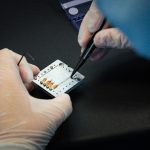Quantum Particulars Guest Column: “The roadmap to quantum value: how organizations are finding utility with today’s quantum computers”

“Quantum Particulars” is an editorial guest column featuring exclusive insights and interviews with quantum researchers, developers, and experts looking at key challenges and processes in this field. This article, focusing on the roadmap of quantum value, was written by Bill Shipman, CTO, and Maurice Benson, Chief Engineer of POLARISqb.
Imagine sitting down at the wheel of your electric car, pairing your smartphone to continue your
podcast, and turning onto the road, confident in your real-time mapped position on the way
to your destination. The products in this scenario are mature and drive value; we can see these
products are the evolution of earlier technologies with utility but uncertain value. Quantum
Computing is on the road toward becoming a technology that will have immense value in
countless ways, but exactly where is it on that roadmap today? There have been major
advances in quantum computing, yet it remains true that quantum computers have not achieved
the vaunted ideal of “Quantum Advantage” or that even more breathtaking concept of “Quantum
Supremacy.” Quantum computing may be entering an era where these maturing platforms offer
significant value in the form of Quantum Utility.
As a company that utilizes the power of today’s quantum annealing computers to create a
product, we are leveraging that utility today. At the close of last year, POLARISqb joined a
number of the most noteworthy companies in the quantum industry at the Q2B conference in
San Jose, themed “The Roadmap to Quantum Value,” during which we presented the release of
our Software as a Service product, Quantum-Aided Drug Design (QuADD). QuADD searches a
molecular chemical space of up to 10^30 potential molecules and returns a set of best-fit
molecules to the user in a matter of minutes, leveraging quantum computing to speed up the
identification of preclinical drug candidates.
One of the most impactful talks in Q2B was by leading quantum computing expert Dr. John
Preskill, who gave the keynote address. Preskill coined terms that characterize modern
research, such as “Quantum Supremacy” and “Noisy Intermediate Scale Quantum” (NISQ)
which are well-known concepts in the industry. After acknowledging the theme of quantum
value, Preskill made two powerful assertions in his keynote speech:
● NISQ is valuable for scientific exploration. But there is no proposed application of NISQ
computing with commercial value for which quantum advantage has been demonstrated
when compared to the best classical hardware running the best algorithms for solving
the same problems.
● What we can reasonably foresee [for quantum computing]. Nor are there persuasive
theoretical arguments indicating that commercially viable applications will be found that
do not use quantum error-correcting codes and fault-tolerant quantum computing.
To paraphrase Preskill’s two assertions, quantum computing will not be useful for practical
applications until key milestones such as error-correcting codes and increased fidelity of logical qubits are achieved. Looking ahead, Preskill stated that possible quadratic
speedup for large optimization problems is possible. An example of such speedup is the recent
breakthrough by MIT and the University of Maryland researchers, who are now running
quantum algorithms on 48 logical qubits. These and other findings indicate that the field is
transitioning from the NISQ era to what some call the Logical Intermediate Scale
Quantum (LISQ) era. As crucial milestones are reached in the future, the quantum value
will influence research and industry to greater degrees.
A Deeper Dive at the Quantum Value RoadMap
There are several impediments on the roadmap of using today’s quantum computers related to the fact they currently process information differently than classical computers. Rebel Brown, a tech and
market strategist, highlights the differences: “Unlike classical computers, quantum computers
cannot read any additional data once they start running a problem. They ingest each variable
into a qubit and then run the computations.” With current quantum computers topping
out in the thousands of qubits, the size of problems they can solve is limited. Philipp Harbach,
global head of group digital innovation at Merck KGaA, makes another insightful point
“Primarily,[Quantum Computing] will accelerate existing processes rather than introduce a disruptive new application area.” There is a real ability of quantum systems to
help solve real-world problems today, and as IBM published earlier this year, this application
indicates quantum utility. IBM states, “Quantum utility is what we get when a quantum
computer is able to perform reliable computations at a scale beyond brute force classical
computing methods that provide exact solutions to computational problems.” To return to the
Q2B theme, “The Roadmap to Quantum Value,” such utility has value, and companies like ours
are on this road, capitalizing on this utility. POLARISqb is solving challenging problems today
and is designing approaches to solve more complex problems as new quantum computing
systems become available.
What utility are companies achieving with today’s quantum computers? In Preskill’s keynote, he
mentioned a paper by Dalzell et al. (2023) “Quantum algorithms: A survey of applications and
end-to-end complexities.” In the optimization section, two assertions are made:
1. Large problems can become intractable with classical algorithms.
2. Recent advancements in quantum computation have shown instances where adiabatic
quantum algorithms exhibit a notable advantage over classical computers,
demonstrating the potential for faster problem-solving in specific computational
scenarios.
The quantum computing company D-Wave published an article in Nature demonstrating specific
cases in which quantum annealing outperforms classical stochastic algorithms. This
research indicates that there are scenarios where today’s quantum computers can prove useful
for optimizing large datasets, a utility that is valuable in a number of real-world scenarios.
At POLARISqb, our QuADD platform uses quantum annealing computers to design preclinical
drug candidates. QuADD identified structures that appear in three separate patents by three
different organizations, and it did so in hours rather than the typical drug discovery timeline of
months or even years. By leveraging the power of quantum-powered multi-object
optimization, we are able to accelerate critical steps of the drug discovery pipeline by orders of
magnitude, delivering a real-world return on investment to our clients through the
implementation of quantum computing in their processes.
There are several other current examples of the utilization of quantum computers today.
Groovenauts employs quantum-powered machine learning to optimize garbage collection routes
in Tokyo, demonstrating an increase in efficiency using quantum technology. The resulting plan
has the potential to reduce nearly 60% of their carbon emissions. SavantX has
actualized real-world results leveraging D-Wave’s Advantage quantum computer providing a
decrease in the crane’s daily travel distance, increasing the deliveries per crane, and optimizing
crane utilization at Pier 300 of the Los Angeles Port, one of the busiest shipping facilities in the
world. This type of optimization is a real-world validation of quantum computing delivering
savings both in labor and money.
Looking Ahead
To be clear, we are not “there yet” on the quantum-computing roadmap as there are no claims that
similar results cannot be achieved running the best algorithms on the best classical hardware.
While it may be the results POLARISqb generates with quantum annealers could be achieved
using classical computing resources, sampling combinatorially large datasets for the solutions
that meet our constraints at near-instant speed has proven to be of valuable utility to our
process, and helped accelerate the research of our clients and partners. At POLARISqb, we are
leveraging the utility of today’s quantum computers to bring value to the discovery process of
tomorrow’s drugs, with the promise of changing the way chemical research may be
accomplished for generations to come.
The coming curves and bumps on the road to the future of quantum computing are not clear, as
the road is being built as we travel. However, the fact that quantum utility is currently being
used to address a number of real-world problems today holds the promise that as improvements
in quantum infrastructure, hardware, and algorithms continue we will see major achievements in
a number of fields as we discover the roadmap from quantum utility to quantum advantage.





















